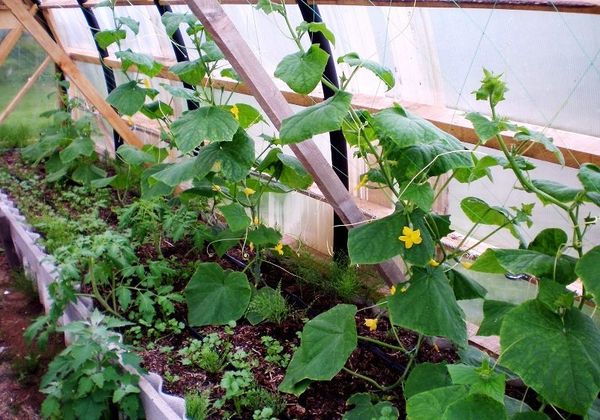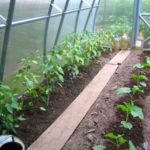When planning the planting of cucumbers in a greenhouse, it sometimes turns out that a rather large area remains free. It is not always rational to grow more greens, as an option to choose a culture of an unobtrusive neighbor. The article will discuss what plants can be safely cultivated and planted in the same greenhouse with cucumbers.
Table of contents
Joint planting of cucumbers in a greenhouse or polycarbonate greenhouse
Everyone knows that cucumbers occupy a lot of space on the beds, the length of the lash of some varieties reaches 2.5-3 m. When grown in a greenhouse because of a stable moist environment, there is a need to tie stalks on the trellis, thereby freeing up a lot of space.
Hothouse method of growing vegetables requires considerable effort, so it is reasonable fill each empty area with saplings of other plants.
With a cucumber quite get along:
- tomatoes;
- pepper;
- watermelons;
- peas;
- leaf turnips;
- mustard;
- Chinese cabbage and others
- Joint planting of cucumbers and tomatoes
- Cucumber and peppers
Benefits
Growing in the greenhouse at the same time Zelentsy and other crops is not only possible, but also beneficial. This method has several advantages at once:
- rationally used greenhouse space;
- shelter protects plants from the abundance of moisture and other vagaries of nature;
- you can get an early harvest of several vegetables at once;
- the ability to control the level of humidity of the air and soil by opening the vents and using an irrigation system (sprinkling, drip);
- cost savings on heating and electricity, which is typical for the operation of several greenhouse structures.
With proper combination of vegetable crops you can increase the yield of greens. For example, if you plant sunflower or corn with the subsequent sharing of cucumber seedlings, gardeners do not need to install trellis and garters.
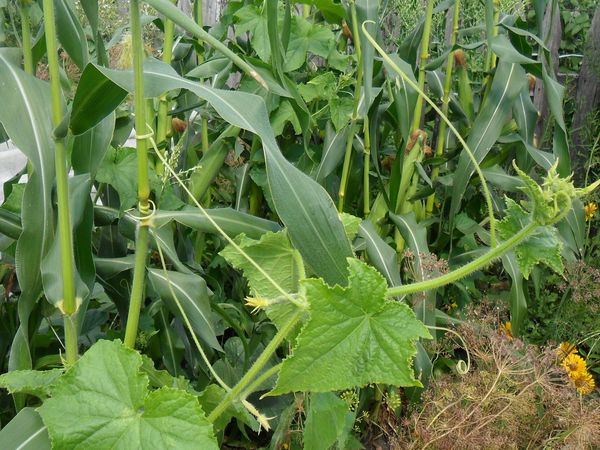
Developing whips, releasing the antennae themselves will cling to the trunks neighbor, creating a vertical bed. And asparagus beans planted right between the rows will provide good aeration. This is achieved through a powerful root system that constantly loosens the soil.
Joint plantings are also useful because plants protect each other from pests and diseases (the so-called symbiosis). This eliminates the use of drugs with toxic substances. It will be easier for crops to survive in drought, the soil with dense planting retains moisture longer.
What to plant and grow with cucumbers
Each plant recommended for the neighborhood affects cucumbers in its own way. Some increase the fruiting period, others - improve taste.
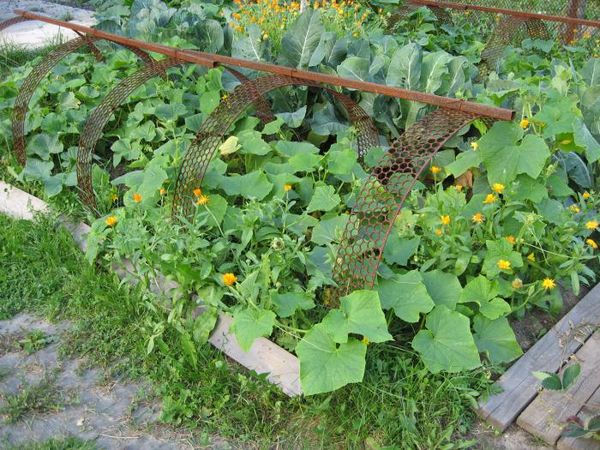
One of the recommended neighborhood options is to plant a flower. calendula. Both plants contribute to the development of each other.
Most often, near Zelentsov planted pepper. In hothouse conditions, it is necessary to provide arrangement of beds in such a way that all cultures have enough daylight. Vertical trellis can be planted around the perimeter with pepper or eggplant.
It should be remembered that bitter and sweet pepper varieties should not be around, when pollinating bitterness can go to the neighbors.
Legumes ideally combined with cucumbers. This tandem allows you to increase the yield of greenhouse. And the lack of moisture will not be felt in the soil. Among the recommended vegetables: beans, peas, asparagus.
No less useful for development and fruiting are: Chinese cabbage, spinach, celery. This neighborhood allows you to get greens with high taste.
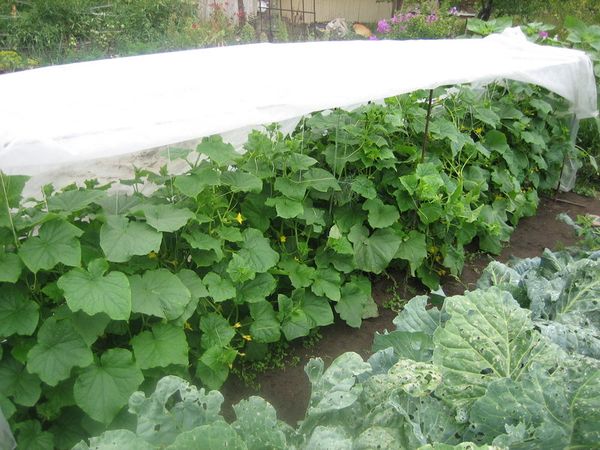
In regions with a harsh climate, it is possible to grow melon crops only in greenhouse conditions. When organizing vertical beds, it is possible to combine the cultivation of cucumbers with watermelons and melons. It is important only when airing to ensure the absence of drafts so that the dessert fruits do not die.
Tomatoes - the pros and cons of growing together
Regarding the close planting of tomatoes and cucumbers, gardeners' opinions differ. Some believe that the differences in the conditions of growth prevent two cultures from getting along in the same greenhouse. Others are confident that with the right organization of the beds such a combination quite acceptable and they can be put together.
To solve the problem is quite simple - the beds after planting need to mulch. Mulch prevents overdrying of soil and the formation of evaporation.
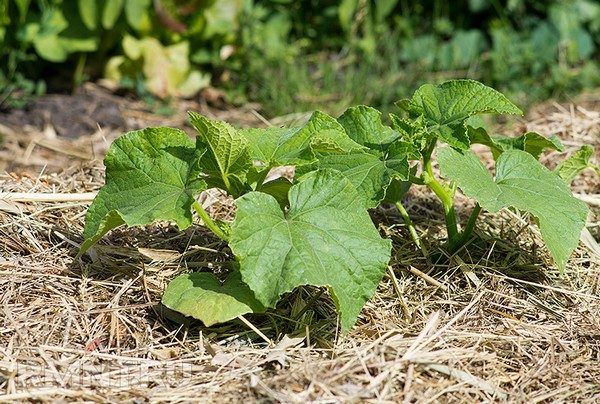
Most of the water used for irrigation goes deep into the ground or is converted into steam, creating favorable conditions for the development of rot in a greenhouse made of polycarbonate or a greenhouse.In this case, it is rational to monitor the level of humidity with the help of air vents and doors. Ventilation refers to preventive measures against fungal infections.
Another way to prevent the formation of vapors is to use hydrogel. A handful of soaked polymer is put into each well before planting seedlings. Water can be replaced with a solution of mineral fertilizers, then the procedure will be complex.
The use of hydrogel reduces the intensity of irrigation, makes the irrigation process more productive. When decomposed, the material decomposes into water and carbon dioxide, which will only benefit the soil.
Advantages from the neighborhood of tomatoes and cucumbers:
- saving space, water for watering;
- increase the functionality of the greenhouse;
- the possibility of using biological methods in the fight against pests and diseases;
- control of temperature and soil moisture;
- purchase the same fertilizer for both plants.
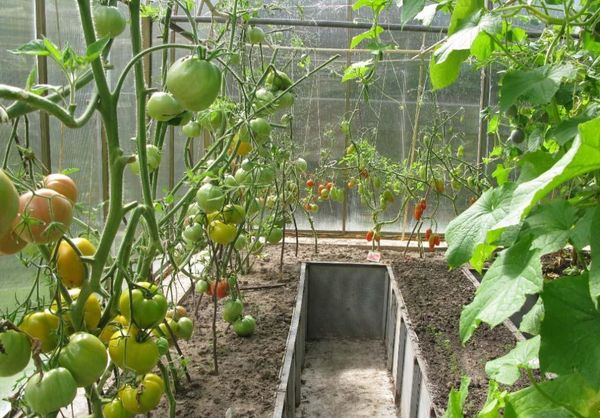
Neighborhood of cucumbers and tomatoes:
- high probability of plant damage by various diseases and pests;
- the need to identify a priority culture;
- arrangement of the greenhouse with curtains or partitions, the use of special equipment.
Unwanted neighbors for cucumbers
When choosing a neighbor for Zelentsov should be guided solely by knowledge. Cannot be planted near cucumber beds aromatic herbs. Although most of them scare away insects, they can change the taste of a vegetable.
Onion and garlic pull out the maximum amount of nutrients from the soil, it will slow down the development of cucumber lash and roots, will lower the yield.
Cannot be planted near cucumbers and potatoes. The reasons for the negative neighborhood are several. First, it is actively developing the root system, which can damage the weak cucumber root. Secondly, the plants have different conditions for planting, watering, fertilizers. The Colorado potato beetle in general represents a great danger for green grass.
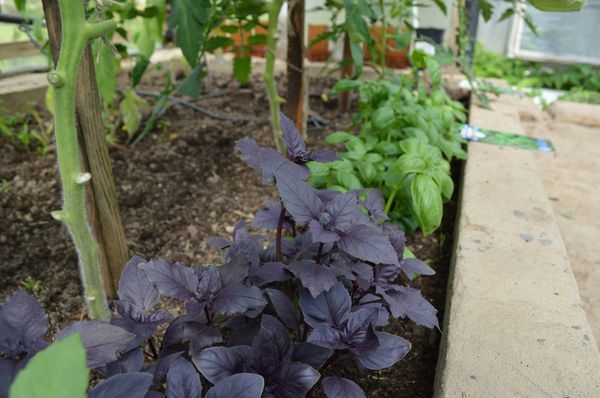
Hurt the yield of cucumbers can radish. It also prevents the development of the root system, reduces the taste of green fruit.
Observing the rules of the neighborhood on greenhouse beds, favorable conditions are created for the development of both cultures. As a result - high yield of vegetables without loss of taste.
